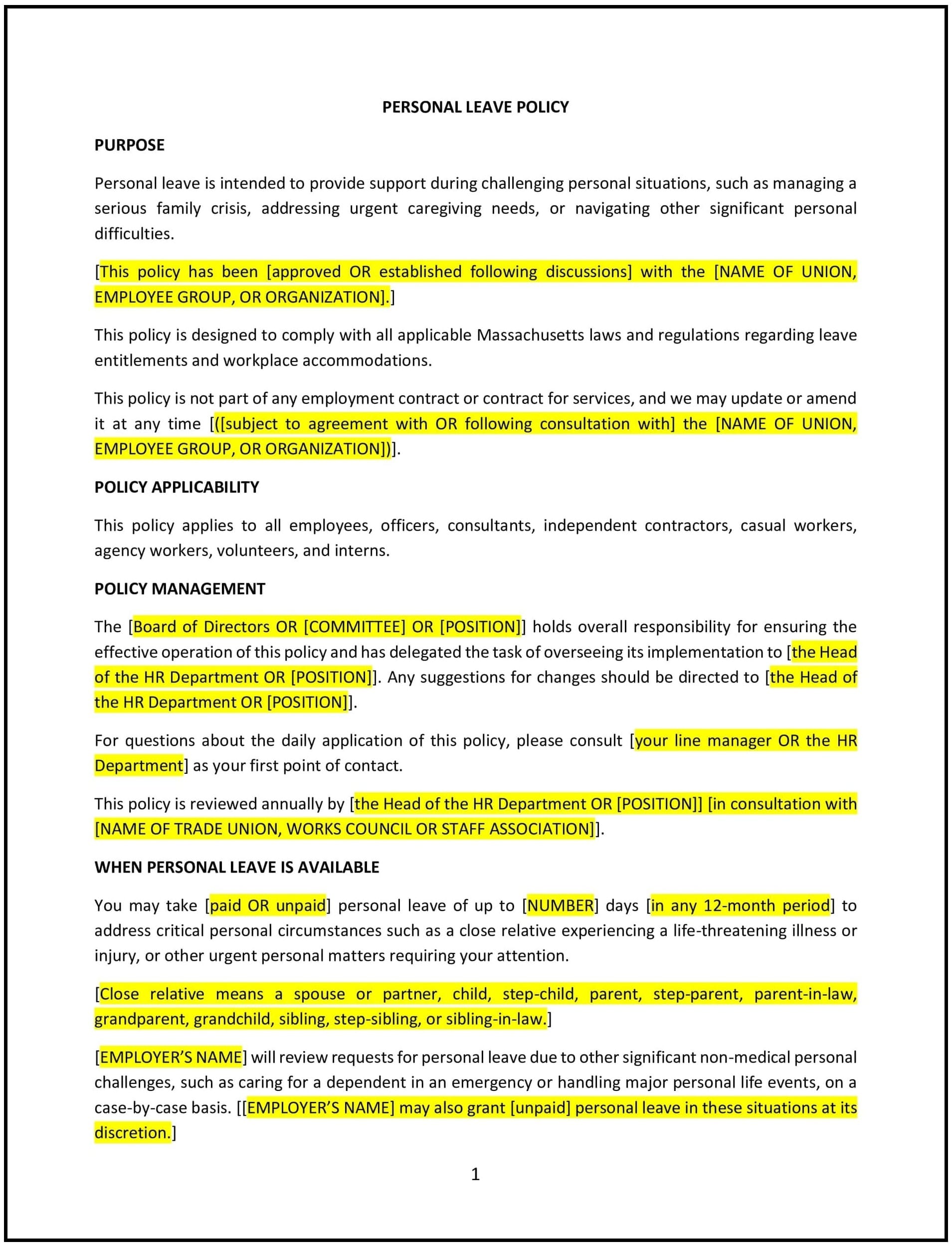Personal leave policy (Massachusetts): Free template
Got contracts to review? While you're here for policies, let Cobrief make contract review effortless—start your free review now.

Customize this template for free
This personal leave policy is designed to help Massachusetts businesses establish clear and consistent guidelines for providing employees with time off for personal reasons. The policy outlines the process for requesting personal leave, the eligibility requirements, and the conditions under which personal leave is granted. It promotes compliance with Massachusetts state laws, including the Massachusetts Paid Family and Medical Leave (PFML) law, and provides a fair and transparent approach to managing employee leave.
By adopting this policy, businesses can support employees in balancing personal responsibilities with their work commitments, improve employee well-being, and ensure that leave requests are handled consistently and equitably.
How to use this personal leave policy (Massachusetts)
- Define eligibility for personal leave: Specify which employees are eligible for personal leave, including full-time, part-time, and temporary employees. The policy should outline any length-of-service requirements and other conditions for eligibility.
- Outline the process for requesting personal leave: Provide clear instructions for employees on how to request personal leave, including the required notice period and any necessary documentation. The policy should clarify how far in advance employees need to submit their leave requests and the procedure for notifying their manager or HR.
- Define the duration of personal leave: Specify the maximum duration of personal leave available to employees. This can vary depending on the company’s leave policies and may include a fixed number of days or a flexible time-off arrangement. The policy should also outline whether the leave is paid or unpaid.
- Address benefits during personal leave: Clarify how employee benefits, such as health insurance, retirement contributions, and paid time off (PTO), will be handled during personal leave. The policy should specify whether benefits will continue during leave and whether employees are required to cover the cost of their benefits while on leave.
- Job protection during personal leave: The policy should specify whether job protection is guaranteed during personal leave. Employees should be informed of their rights to return to their same or an equivalent position after the leave period ends.
- Discuss return-to-work procedures: Outline the procedures for employees returning to work after personal leave. This may include providing notice of their return and any required documentation or updates related to their leave.
- Address extraordinary leave: If the company offers personal leave for extraordinary circumstances (e.g., family emergencies, personal health issues), the policy should specify what qualifies as an extraordinary situation and how leave will be granted in these cases.
- Ensure compliance with Massachusetts and federal laws: Ensure that the policy complies with Massachusetts state laws, including the PFML law, and federal regulations such as the Family and Medical Leave Act (FMLA) if applicable. The policy should also ensure that it does not violate any labor agreements or union rules.
- Review and update regularly: Periodically review and update the policy to ensure it is compliant with changes in Massachusetts state laws, federal regulations, and the company’s evolving leave practices.
Benefits of using this personal leave policy (Massachusetts)
This policy offers several benefits for Massachusetts businesses:
- Supports employee well-being: By offering personal leave, businesses help employees manage personal responsibilities, such as family care or health issues, while maintaining their work-life balance.
- Promotes fairness and transparency: The policy ensures that all employees are aware of how personal leave is granted and what the process entails, promoting fairness and transparency in leave decisions.
- Reduces legal risks: By promoting compliance with Massachusetts state laws, including PFML and FMLA, the policy reduces the risk of legal challenges or penalties related to leave practices.
- Enhances employee retention: Providing personal leave helps employees feel valued and supported, which can increase employee satisfaction and retention.
- Improves workplace morale: A clear personal leave policy helps employees feel confident that their needs will be met in the event of personal issues, leading to higher morale and productivity.
- Aligns with company values: The policy demonstrates the company’s commitment to supporting employees in managing their personal and professional responsibilities, which aligns with a family-friendly, supportive workplace culture.
Tips for using this personal leave policy (Massachusetts)
- Communicate the policy clearly: Ensure that all employees are aware of the personal leave policy and understand the process for requesting leave, including how much notice they need to provide and any required documentation. Make the policy available in employee handbooks or internal documents.
- Provide training for managers: Train managers on the company’s personal leave policy to ensure they handle leave requests fairly and consistently. Managers should be equipped to discuss leave options with employees and understand their rights and responsibilities regarding leave.
- Track leave usage: Maintain accurate records of employees’ personal leave usage to help ensure that leave is granted appropriately and in compliance with the policy. This helps the company stay organized and ensures that employees do not take more leave than is permitted.
- Address concerns promptly: Employees should feel comfortable raising concerns or questions about their leave entitlements. Make sure there is a clear process for employees to discuss leave-related issues with HR or their manager.
- Review and update regularly: Periodically review the policy to ensure it is compliant with Massachusetts state laws, federal regulations, and evolving company needs. Update the policy as necessary to reflect changes in the law or business practices.